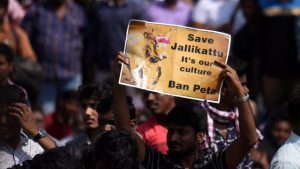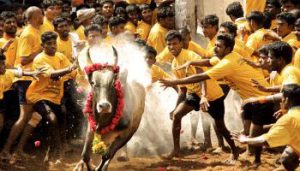Anisha has done MBA in Marketing from NMIMS And Executive Management(PMNO) from Harvard Business School. She has been instrumental in growing CATKing Digital with her experience with Marico and Henkel in the past.
Introduction:
On one side, we have the government trying to ban everything and anything controversial and on the other hand the government lifted a ban that agitated more people than it pleased. Jallikattu of Tamil Nadu the bull-taming game, known for its torturing nature has been given a nod.
Jallikattu was banned four years back when PETA and Animal Welfare Board of India (AWBI) documented and reported the practice of taming animal by torturing and angering them. The AWBI had written to the environment ministry on December 31, advising against any such action to lift the ban but it seems that the centre turned a deaf ear to the suggestion.
Along with Jallikattu of Tamil Nadu, the ban lift also applied to bullock cart racing games of Maharashtra, Karnataka, Punjab, Haryana, Kerala, and Gujarat. Is it just politics for vote banking for the upcoming polls? Would politics always come before welfare andhumanity?
Yes:
- The people of Tamil Nadu had happily welcomed the ban on Jallikattu in the year 2011. They were aware of the nature of the game. Despite the highest court of the country’s decision to ban this so called game, the government took it to themselves to lift the ban. PETA India is also not in support of this act and have decided to move the SC against the centre on this.
- During Jallikattu, bulls are purposefully scared and petrified and then made to run across the crowd, destroying anything that would come in their way. Various cruel means are adopted to scare and anger the bull like pinching, nailing, stabbing with sticks that have nails at the edges, twisting their tails and even forcefully making them drink alcohol and other drugs. The rope around their nose are painfully yanked and then they are dragged into the crowd of people who further anger the bull. The animals does what it could to get away from the danger that it sees in humans, cruel beings of the highest order.
- According to the documents by PETA, these bulls also break their bones in order to escape from the crowd continuously trying to toture them. Casualty and death of humans are also alarmingly high during this game. If reports are to be believed, from the year 2012 to 2014, there have been approximately 1100 human casualties and 17 deaths during Jallikattu and other such events. Those visitors who just watch the event and not participate are also at the risk of being hurt.
- On 7th May 2014, the Supreme Court had strictly and clearly mentioned while banning Jallikattu that bull races and other usage of bulls for performances would not be permitted and the concerned ministry would not modify the notification without the consent of AWBI. The court had also stated that when culture and traditions clash against the laws enacted by the parliament, the law will be given primacy. However, none of this was kept in mind while lifting the ban and hence the SC ruling literally shunned aside.
- The most hypocritical move by the same government that screamed out loud for ban on beef and to stop cruelty against cow and her progenies came as a shocker for everyone who thought that banning beef was kind and good heartedness of the government. 60,000 people of the country signed the online PETA petition to maintain the ban on Jallikattu. However, the government seems only too concerned about the polls to care for what the people of India actually want.
- Other countries around the world that entertained sports like bull fighting have looked upon our nation for its compassion towards animals and have stopped these games at many levels. But this lifting of ban and allowing the game of Jallikattu to prosper will mark the black day of our nation that shall now be viewed as “archaic and regressive.”
- As the environment ministry talks about tradition and reviving of age old cultures, it makes us wonder what in the name of god would promote culture by torturing an animals beyond wits. The event of Jallikattu is usually organized during the Pongal festival. Pongal is the festival of harvest, thanking god for giving us food and good harvest. Mattu Pongal is for celebrating the hard work of cattles that worked through hunger, thirst and pain. What way of thanking these animals should involve exposing them to immense pain? Some families garland these animals, treat them and even worship them to show gratitude making us wonder which of these should be called traditions and need revival.
No:

- The Pongal festival is supposedly incomplete without this event that is said to signify “manliness” and supremacy of men over animals.
- Some say that the animal used in Jallikattu is not tortured and rather it is the people holding its horn who are at risk of being hurt but put forth their bravery to tame the bull.
- According to environment ministry and other government officials, the ban has been lifted but the rules have changed. Regulations have been imposed to prevent cruelty on animals. No drugging or beating or nailing of these bulls would be entertained and the welfare of animal team would check the health of the animals prior to the game and also after the game.
- Precautionary measures like proper fencing and removing the crowd soon after the animal is tamed would be implemented to prevent viewers from getting injured. The government and the environment ministry have reviewed the Jallikattu game and then allowed the ban lift so there should be no displeasing anyone. PETA and AWBI can always be expected to exaggerate these situations.
Conclusion:
Allowing Jallikattu may have pleased the bull tamers and a majority of people in Tamil Nadu but the greater population of the country is agitated by how the government is keeping its vote banking politics above the welfare of people and its self-claimed kindness towards animals. Even the opposition is not reacting to this disastrous step – anything for appeasing the voters in the upcoming polls.
The biggest mistake yet was not the lifting of ban on Jallikattu but the undermining of institution the way centre carried out the procedure. It should have followed the laws and asked the court to review the ban instead of doing it the unconstitutional way just to appease popular sentiments of the people of Tamil Nadu. An app has soon started doing rounds on the popular sites, calling for people who fancy buying Jallikattu bulls.





